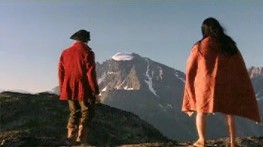This week I took my first flight since the pandemic began, winging west for a long-delayed family visit. As I scanned a newspaper en route Calgary I read that on that day in 1793, Alexander Mackenzie reached the Pacific Ocean from the east, becoming the first European to cross the continent north of New Spain. It was an epic journey by an extraordinary explorer.

Mackenzie was born in Scotland in 1764. As a youth he moved with family to New York and then, during the American Revolution, to Montreal, where he was apprenticed to a fur trading company. He showed a talent for the trade and wilderness life and became a partner in the enterprise in 1785. In 1787 the company merged with the Montreal-based North West Company, and he was instrumental in the Norwesters’ expansion into the western and northern reaches of North America. In June of 1789, the 25 year old left Fort Chipewyan on Lake Athabaska (on the present-day border of Saskatchewan and Alberta) with a small party of voyageurs and indigenous guides to explore for the fabled north-west passage to the Pacific. Travelling by canoe, they followed a great river known to the Dene as the Dehcho, only to find that it emptied into the the impassable Arctic Ocean rather than the Pacific. He called it the River of Disappointment. It is known today as the Mackenzie River.
He returned to Fort Chipewyan and in 1792 established a new trading post on the Peace River to the west. The following spring he set out from there with his voyageurs and guides, again in quest of the north-west passage, this time journeying west. They followed the Peace to its headwaters in the northern Rockies, then south down the Fraser River. Members of the local Dakelh nation told him that the Fraser Canyon was unnavigable and populated by hostile tribes; they advised he travel overland to the west. Mackenzie canoed back up the Fraser then journeyed west by foot.
After a two week trek he arrived at the Bella Coola Gorge, negotiated with the local Nuxalkmc for the use of canoes, and followed the Bella Coola River to Pacific tidewater. He had completed the first recorded transcontinental crossing of North America north of Mexico, 12 years before Americans Lewis and Clark. On a rock, Mackenzie used a mixture of vermillion and grease to commemorate his crossing: “Alexander Mackenzie, from Canada by land, 22d July 1793.”

Standing at the mouth of the Bella Coola, Mackenzie was unaware that he had missed mariner George Vancouver by just forty-eight days. Earlier that spring Vancouver had resumed his exploration of the north-west coast, begun the previous year. As the Pacific coast was fjorded and unknown, Vancouver’s survey method was to leave his ships in a safe anchorage and venture out in small boats for expeditions of ten to fourteen days, then return to the ships, bring them up to a newly confirmed safe anchorage and send the boats out again to survey a new area. When Mackenzie arrived in Bella Coola he heard stories from the Nuxalkmc of blue-coated men who came by sea and were led by a man called Macubah.
Like Mackenzie, George Vancouver was an extraordinary explorer leading an epic expedition. His voyage is the setting for my novel-in-progress, The Wind From All Directions, the status of which I report on here, periodically. Further dispatches in due course – look for it under the “News” tab on this blogsite. My previous post on the project can be found by clicking here.
By the way, one of the treats of flying into Calgary is that glorious glimpse of the Rockies you get upon deplaning. Alas, this trip the mountains were obscured by haze, a manifestation of smoke from the forest fires raging in BC.


